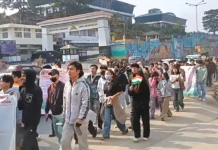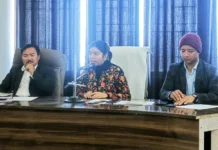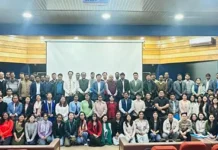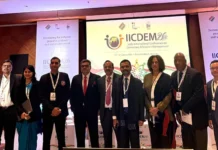Staff Reporter
RONO HILLS, Jun 27: The two-day webinar on the ‘Role of social media in the face of Covid-19 pandemic’ concluded on Saturday with media educators, professionals, vloggers and government representatives placing their points.
Gauhati University’s Communication Department Head, Dr Ankuran Dutta made a presentation on ‘Resurgence of superstition as infodemic during Covid-19 pandemic’.
Pointing out that “superstition and misbelief are still as active as it was in the earlier days,” Dr Dutta said, “Infodemic reaches faster than the disease, and largely affects the average digitally literate person. Digital literacy is inadequate in our society, which is why it is also difficult for digitally literate people to differentiate between fact and fiction.”
While the interests of the people may be in the right place, he said, there is no scientific evidence to back up the misbelief that clapping and clanging utensils, consuming cow urine or dung, and Gangajal or other religious performances could prevent or cure Covid-19.
“Social media is a source of news, but it is not authentic news. Authentic news is a material that is processed through editorial intervention, while social media news is self-authoring and self-publishing, without any filtration or authenticity,” he said, adding: “We should not only sanitize our hands but also sanitize our minds by verifying the facts,” and advised participants to filter facts through digital literacy.
Also participating in the discussion, deputy editor of The Arunachal Times, Tongam Rina, said, “There is a lot of information on social media but not enough news. Social media often creates panic; it is fast and furious and does not cross-check information – but the purpose of news is not to create panic.”
Noting that verifying information with sources and authorities can take up time, she said, “It is not very difficult to get information authenticated in a small state like Arunachal Pradesh.”
She cited the example of the recording of state’s first Covid-19 positive case, when the person’s personal information was shared online, and pointed out that it did not help the person or the authorities concerned (as they already had the required information), and advised people to be more responsible with what they forward or comment on.
However, Tongam also pointed out the positive aspects of social media and how it helped highlight the situation of the stranded labourers, which in turn helped them in receiving essential items as well as their returning to their hometowns.
Raising concern over the government’s recently created fact-checking wing, she said there is a possibility that it could dismiss any news that does not support the government and may be used against journalists. She suggested that the government involve the people as well as journalists apart from government employees.
Tongam further advised users to get their facts checked through Altnews, especially for national news.
Representing the government, DIPRO Higio Zarngam explained the work of the government and how it has been engaged in disseminating information even before the time of Covid-19.
“Our main job is to act as a bridge between the government and the public and make sure that government information and schemes reach the last person. With the pandemic, we had to shift our priority from print media to social media,” Zarngam said.
Vloggers Ayynam Pangin and Rajiv Guchi showcased videos on social media abuse from the common man’s perspective, and how social media served as a positive platform to drum up donations and provide information on runaways from quarantine, respectively.
The webinar was organized by RGU’s Institute of Distance Education and mass communication department, in collaboration with the IPR department.





